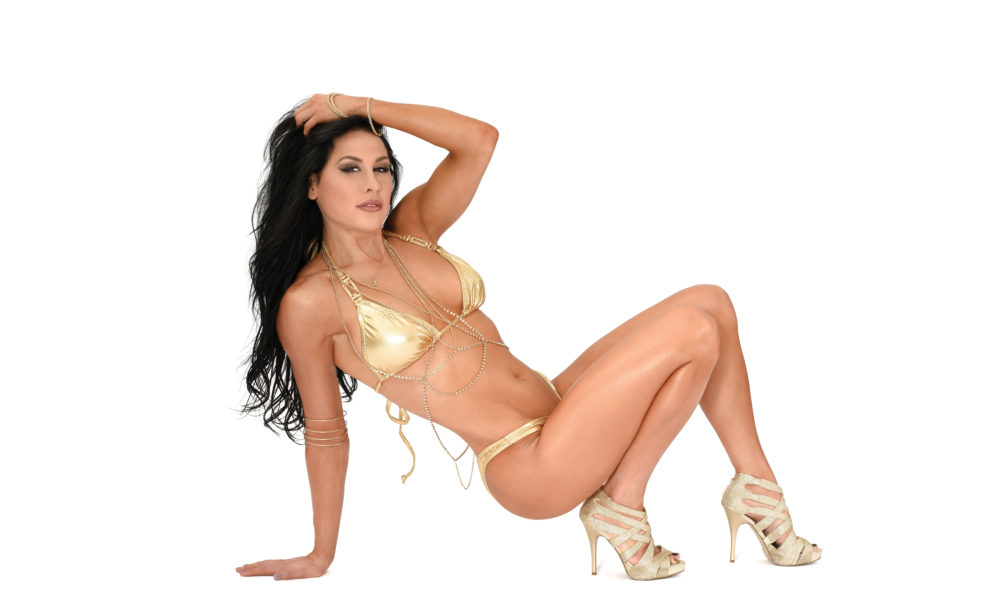

Ashley Kaltwasser is hungry. She’s at the gym when the munchies strike, barely into her warm-up. The last few days were spent at Hakkasan inside the MGM Grand Las Vegas Hotel and Casino as a celebrity judge for a beauty pageant. It’s one more trip in a nonstop travel itinerary she has kept since winning the Olympia last October. She is tired and hungry and generally not feeling the workout. So what does the three-time Olympia Bikini Champion do? She bails.
“I am in a big off-season right now,” she says, laughing. “I am not competing until the 2016 Olympia, so I am definitely in an off-season.”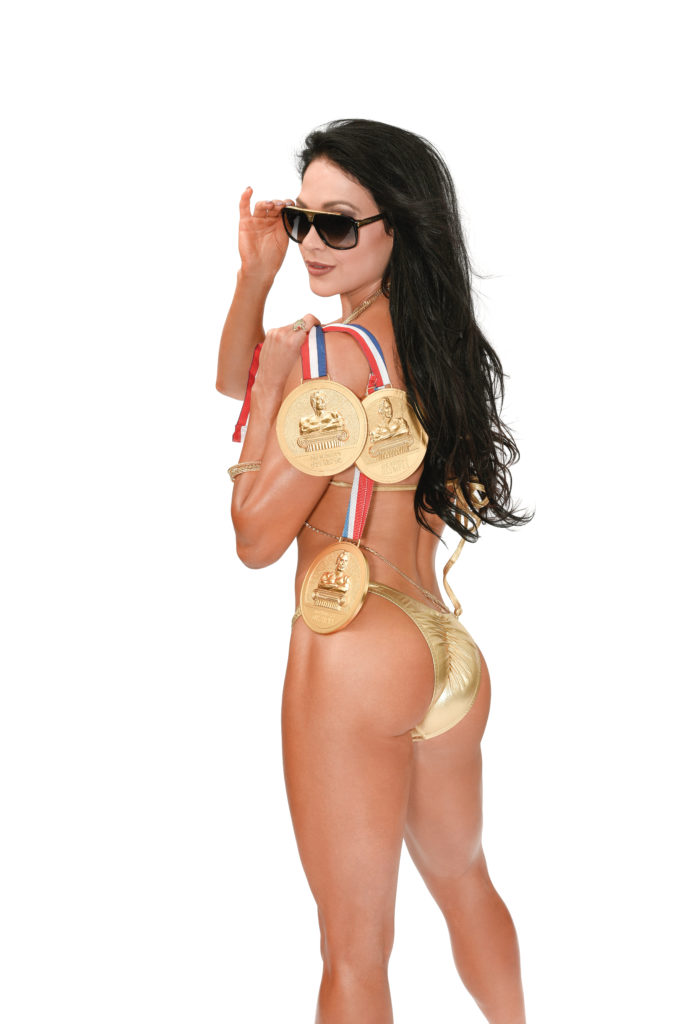
It’s a surprising sentiment from the champ. The current crop of physique athletes tends to espouse a warrior mentality, in which a day off from the gym is a sort of personal failure. All year long they litter their social media with pictures of their stage-ready glutes and plates of homemade protein and vegetables. Kaltwasser, who is the single most dominant professional athlete in the admittedly young sport, tends to go in the opposite direction.
“I am more laid-back than what most people think. Girls sometimes can be so strict and so ‘all or nothing’ they get burned out,” she says. “Bikini is meant to be a maintainable lifestyle. It shouldn’t be as extreme as some girls are doing it. If you know yourself and know how your body works, you don’t need to count every single off-season calorie.”
Kaltwasser’s relaxed approach is a big part of her success onstage and her massive fan appeal. As spectators, we love her ease of execution. Think of Kelly Slater on a surfboard or Conor McGregor knocking out the champ in 13 seconds. When the difficult is made to look easy, beauty springs forth. And Kaltwasser, onstage in her trademark emerald suit and waterfall of straight raven-colored hair or in capris and a baseball cap signing autographs at an expo, makes it all look easy.
Mike Carlson: You had an amazing 2015, winning the Arnold and the Olympia. What are your plans for 2016?
Ashley Kaltwasser: This will be the first time I will focus on just the Olympia. The 2015 season I competed in four shows, and the year before was eight. I might do four again in 2016, but I’m going to wait until the Olympia and then do a cluster of shows. There are some really good international shows after the Olympia, and if I’m all prepped and ready for them, I’ll compete. A lot of people assume I will do the Arnold because Ohio is my home and I won it for the past two years. Unfortunately, it falls right in between some trips, and the travel makes it really difficult to dial in. I’m putting all of myself into the Big Show, which is the Olympia.
MC: You were a track athlete in college. What was your event, and do you think that it gave you a good foundation to become an IFBB pro?
AK: I ran the 400-meter hurdles. It helped out a lot for Bikini. It gave me a good base in terms of my body. I had a pretty good body to start with, and it’s not like I had never lifted a weight before. More importantly, it taught me what hard work was like. Those track practices were no joke. We had two-a- day practices, and anything with 400 meters or 800 meters has a lot of lactic acid build-up and it can make you vomit. I threw up a few times after practice.
MC: How did track help specifically with your physique?
AK: I feel like track really built up my glutes, which is an important muscle group in Bikini. Sprinters tend to have a pretty desirable build compared to some other sports out there. It gave me a good base. I did need to work on my upper body a lot because my legs were way more built than my upper body.
MC: Have you found that more Bikini competitors come to the division from a modeling background or an athletic background?
AK: I think there’s a good mix. I notice there are a lot of cheerleaders in the Bikini division. I feel like there are more athletes in the Figure division because they have the muscle and play off of it more.
MC: What was your diet like in college?
AK: Back in college I thought I was eating pretty healthy, but it was nothing compared to now. I would have three bigger meals a day, and I wouldn’t worry about my carbs and fat. I would start the day off with a couple packs of oatmeal, and then have some pasta and chocolate milk for lunch, and then Subway for dinner. It was kind of healthy, but not really. I was running so much that I was burning through all the calories anyway.
MC: What’s your nutrition program like now?
AK: I’m in the off-season, so every day is pretty different. I’m not counting calories or carbs; I’m just keeping it maintainable so I’m not putting that mental stress on myself. The off-season is the time to regroup and catch my breath so when I start my diet I’m not dreading it. Even in-season I cannot tell you how many calories I’m eating. I don’t do IIFYM or anything, because I hate numbers. I’m more of an intuitive eater. I don’t worry about six meals a day. I eat when I’m hungry, and I keep it reasonable. I do all my own nutrition. I don’t have as specific regimen or anything I follow.
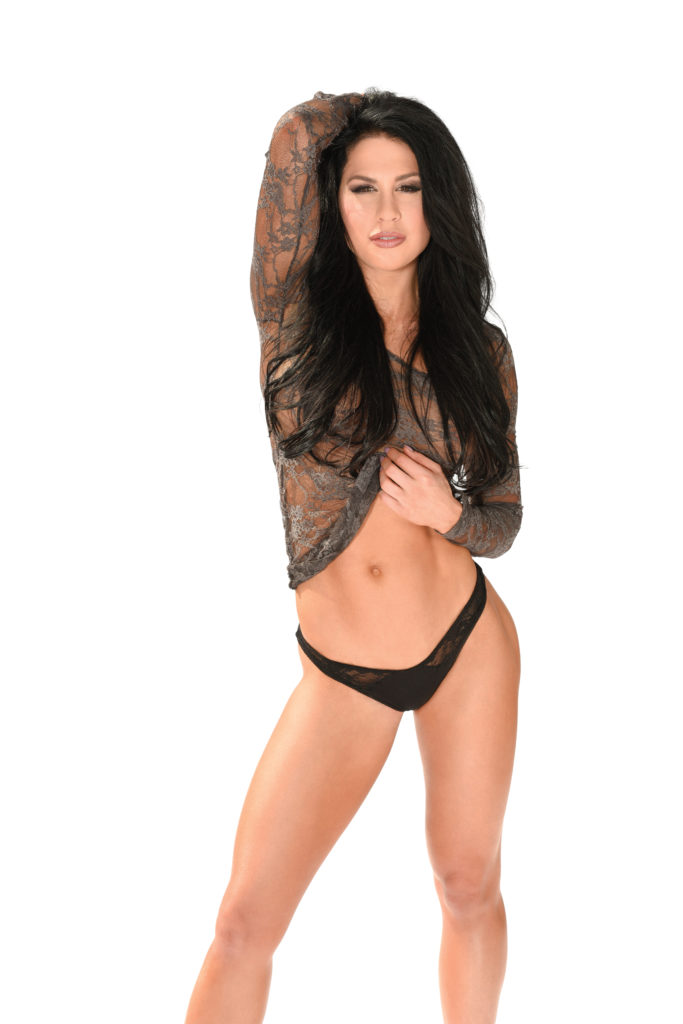 MC: How do you get up for a workout? Is it hard to stay motivated?
MC: How do you get up for a workout? Is it hard to stay motivated?
AK: I am 100 percent a morning person. In fact, most of the time I will wake up before my alarm even goes off. It just seems like I am a lot more energized in the morning. Also, when I wear my Better Bodies gear I feel extra motivated to get shit done! When you look good, you feel good. When you feel good, you get in a killer workout. MC: Does all the traveling make training difficult?
AK: The thing about traveling is that you can never adapt to a routine. You can’t say, “I’m going to wake up at this time and go to this gym and train this bodypart.” It’s a different situation all the time. I’m in Vegas for a week, and I’ll have a meeting or a seminar planned at different times and it throws everything off. When I get closer to a show, I’ll get into more of a routine. I am a good pressure player. When I need to step it up, I’ll step it up big time. I turn that switch on when I need to.
MC: How do you explain what you do to people who aren’t familiar with the fitness industry?
AK: To the people who are totally clueless, I call it a fitness pageant that is looking for a mainstream fit look and without the talking and the gowns. We are not flexing, and obviously we are not dancing or anything. It’s in the realm of bodybuilding, but we are supposed to be very relaxed onstage.
MC: You seem very comfortable in your own skin. Did you ever have an issue with getting onstage wearing a bikini in front of a crowd?
AK: No, I’ve always been super comfortable with it. I have never had an issue with my body. I guess it has a lot to do with genetics, too. I’ve never been down on any part of my body. I have always been super confident when it came to my body. I’ve never really had an issue with it.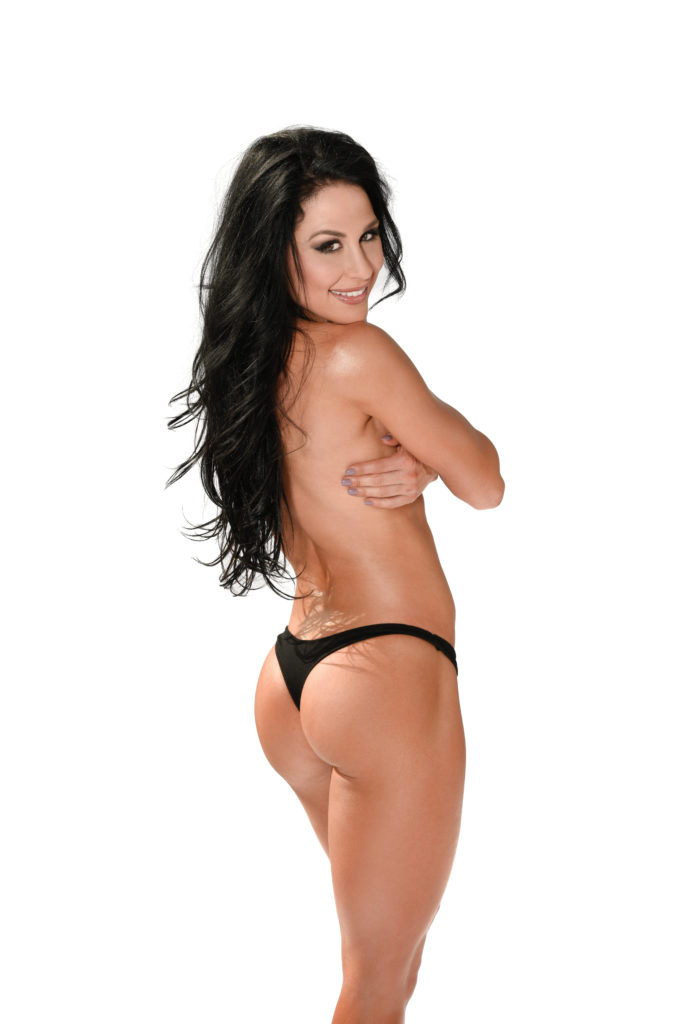
MC: It’s hard to be a repeat champion in a young sport. What do you credit for your consistency?
AK: Just improving myself. In 2013, I won by one point. I took a look back and I knew I could do better. I thought, “Next time, I want them to think, ‘I know that girl will win.’” So in 2014, I won and got a perfect score. There we go. I improved my body pretty drastically in a year, and then in 2015 I got another perfect score. I tried to do more upper body—I always felt that was where I was lacking and maybe I was judged down for that. I also really needed to work on my presentation, and I did that.
MC: What were the biggest changes you made between 2013 and 2014? And what were they between 2014 and 2015?
AK: From 2013 to 2014, I put on a lot more muscle. In 2013, I had very immature muscle; I was a lot smaller and flatter. In 2014, I was a lot fuller. In 2015, my body didn’t change a whole lot from the previous year. Maybe a little bit more upper body. The things that did change were more like the presentation, the hair, the suit, the things I knew the judges would be looking for. I had a perfect score in 2014, so I knew that was what they wanted. The rest were just little tweaks to keep it fresh.
MC: What are your in-season workouts like?
AK: I start cardio about eight weeks out. The closer I get to a show, the more cardio I’ll do. I’ll do one HIIT session a week, and the next week I’ll do two, and then three. I won’t go past five. I average three HIIT sessions a week on a stepmill. On weekends I’ll often run a 5K [3.1 miles]. That’s my longer cardio day. It works for me. It’s better than running on a treadmill, and I am a very competitive person, so it pushes me a bit harder. I’ll lift five days a week for about an hour, sometimes six days a week if I’m feeling extra motivated.
MC: What training modality or philosophy helped the most with your body?
AK: For any bodypart, I switch it up all the time. I always switch it up to keep my body from adapting and keep my mind sane so I’m not dreading the workout. Sometimes it might be heavier with fewer reps, some days it will be all resistance bands, some days plyos.
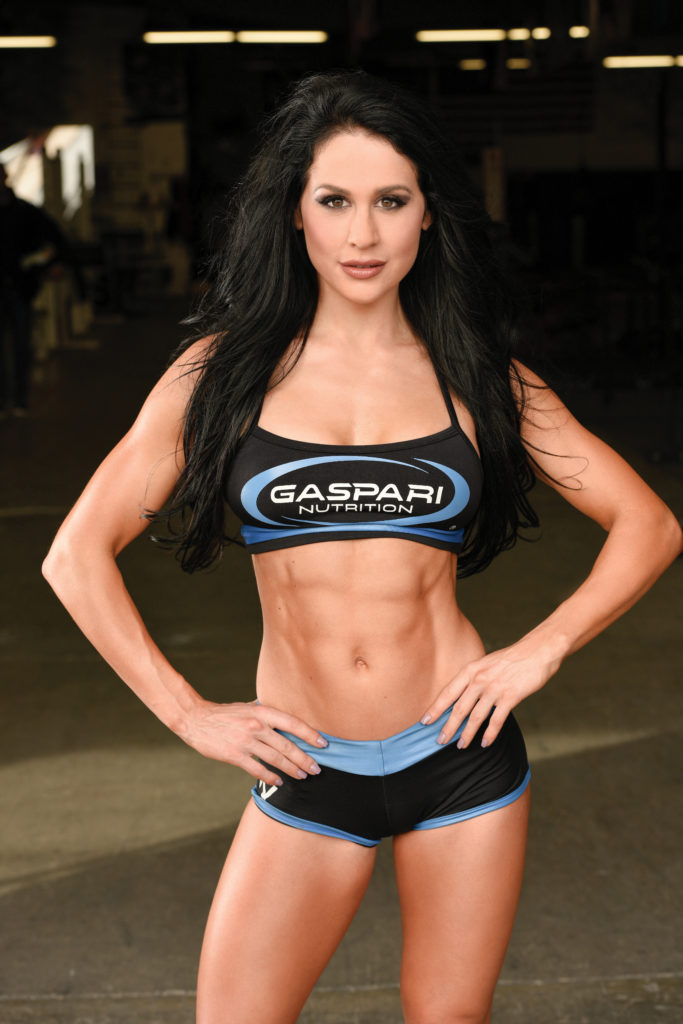
MC: What exercise has done the most for your glutes?
AK: I really like Bulgarian split squats and things that focus on one leg and go really deep. But most of the time you have to be focus on the mind-muscle connection. You can be going through the movement, but you need to be focusing on the muscles that you’re moving. The mind-muscle thing is a big deal for me.
MC: What kind of supplements do you take?
AK: I use all Gaspari Nutrition products. I take IsoFusion whey isolate protein every day, and I will usually put that in my coffee in the morning. I’ll drink Aminolast throughout the day. Not only does it taste good, it’s also good for replenishing electrolytes and, obviously, amino acids. And I take the Anavite multivitamin.
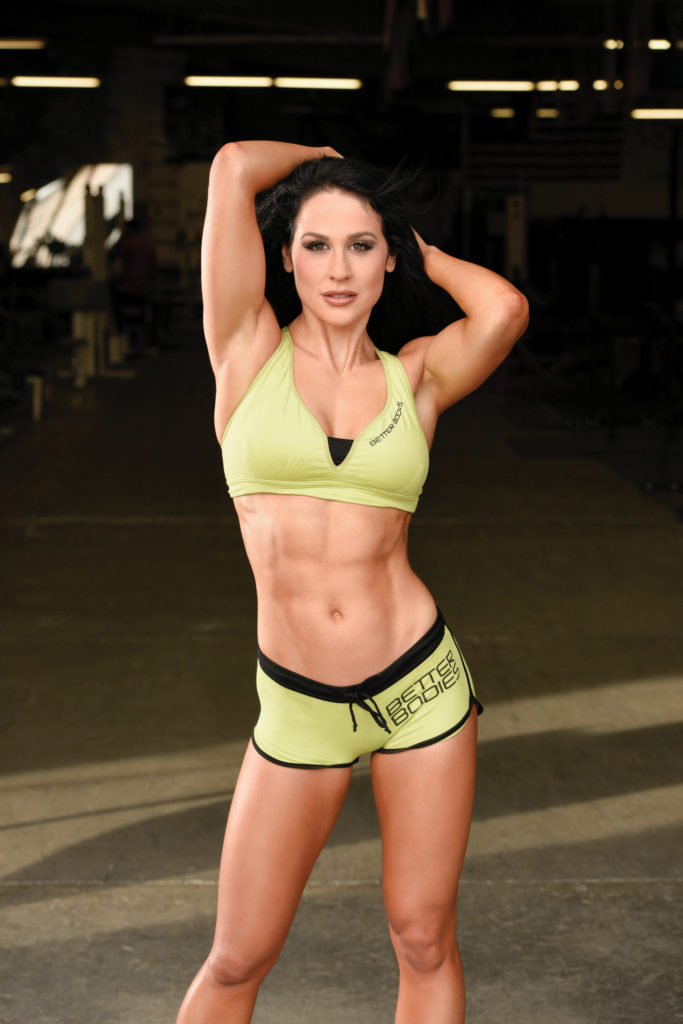 MC: You’re currently single. Do you mostly date fitness people, or do you date “civilians”?
MC: You’re currently single. Do you mostly date fitness people, or do you date “civilians”?
AK: It’s easier to date people in the fitness industry because that’s who I am exposed to. Not that I am opposed to dating “civilians” [laughs]. But when I was in college I dated college athletes because that’s who I was around, that’s who I interacted with, and they under- stood my lifestyle.
MC: So if a computer programmer is reading this, there’s hope for him?
AK: Yes! There is still hope! I like nerds, too.
MC: You hardly left Ohio for most of your life, and now you’re traveling the globe. Is it fair to say you wouldn’t have expected this life for yourself?
AK: I would never have expected it, but I definitely would have chosen it. It’s such a rare thing to be a female in the fitness industry and make a career out of it. I’m a very realistic person. I never thought I could make a career out of it, so I am living it up. I am living the dream right now. IM






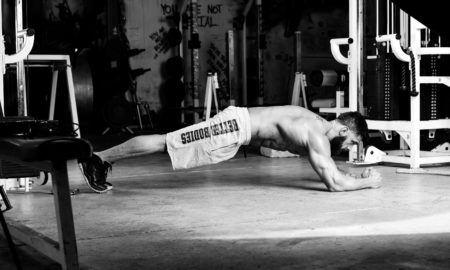
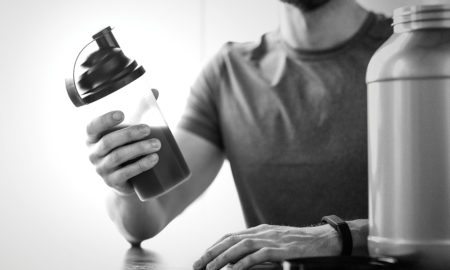





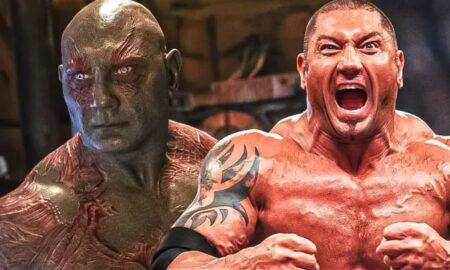
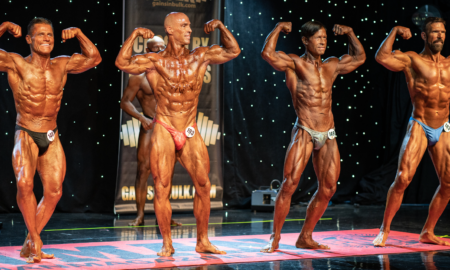
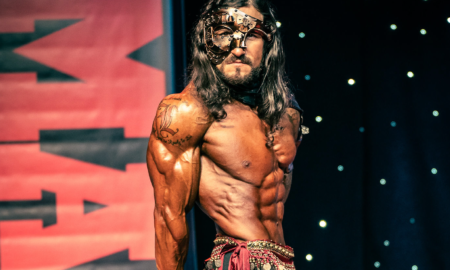
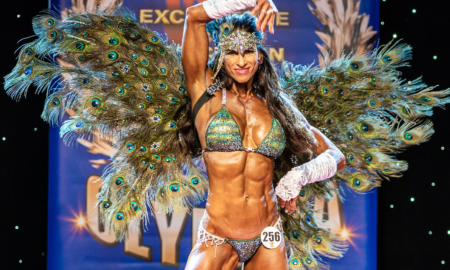
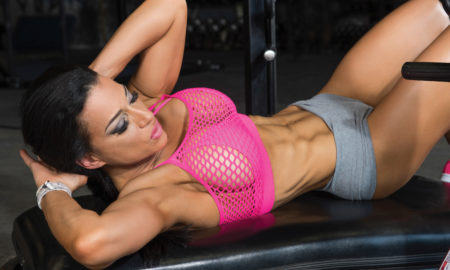
You must be logged in to post a comment Login